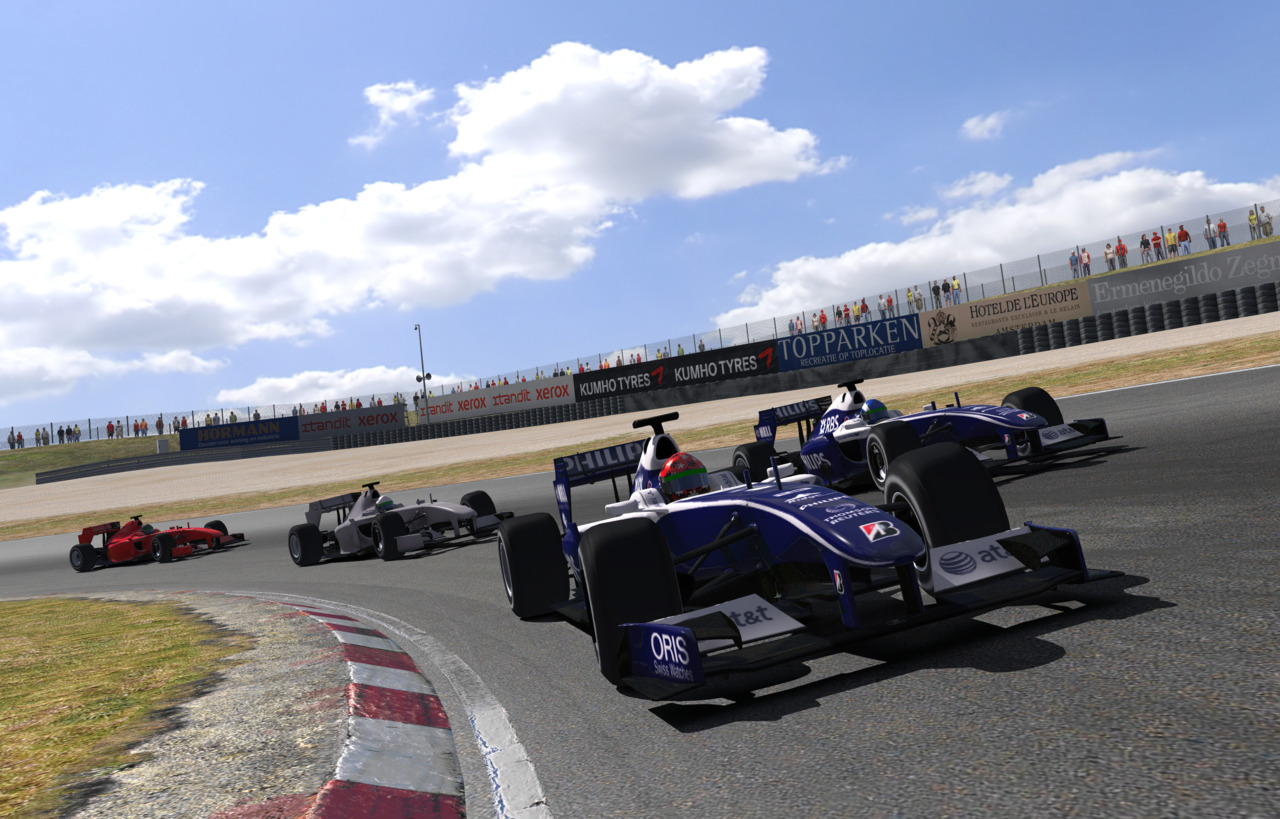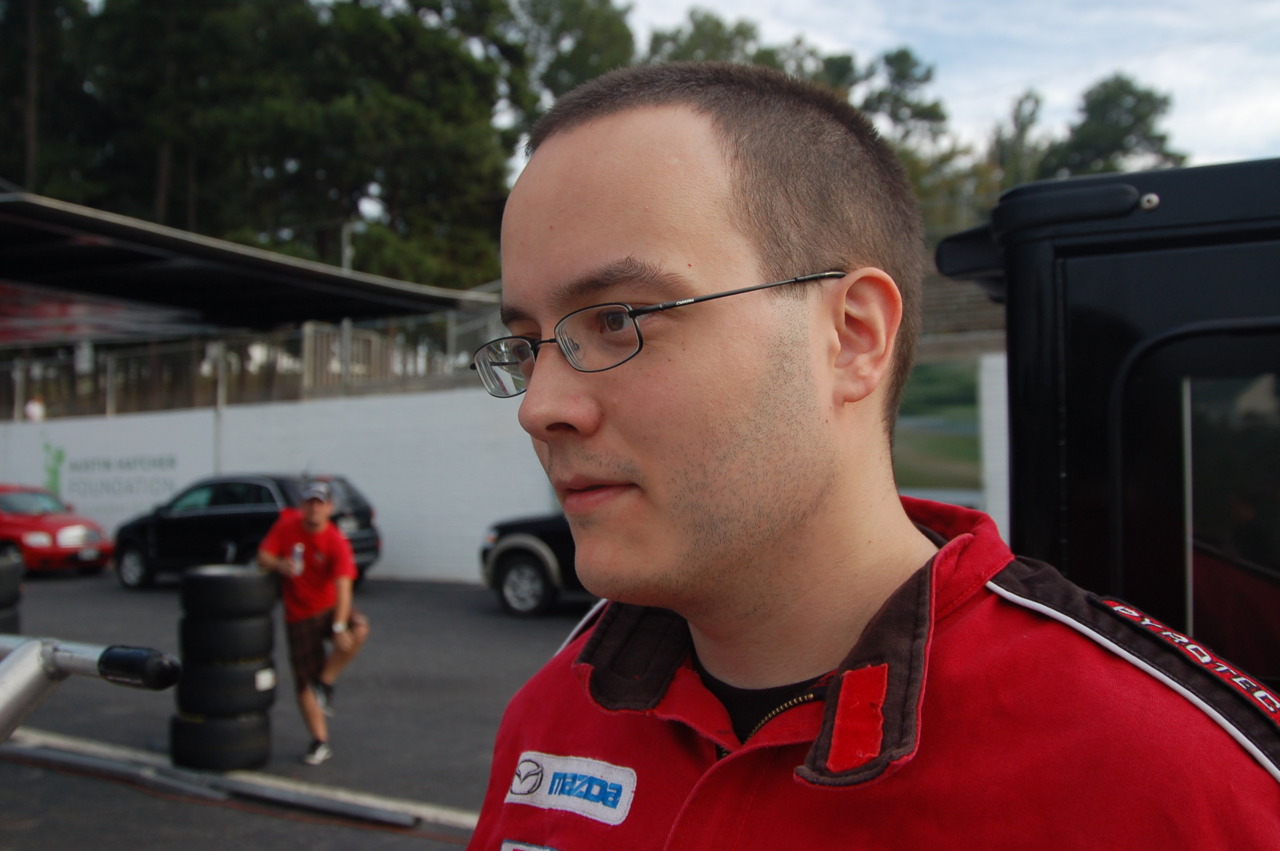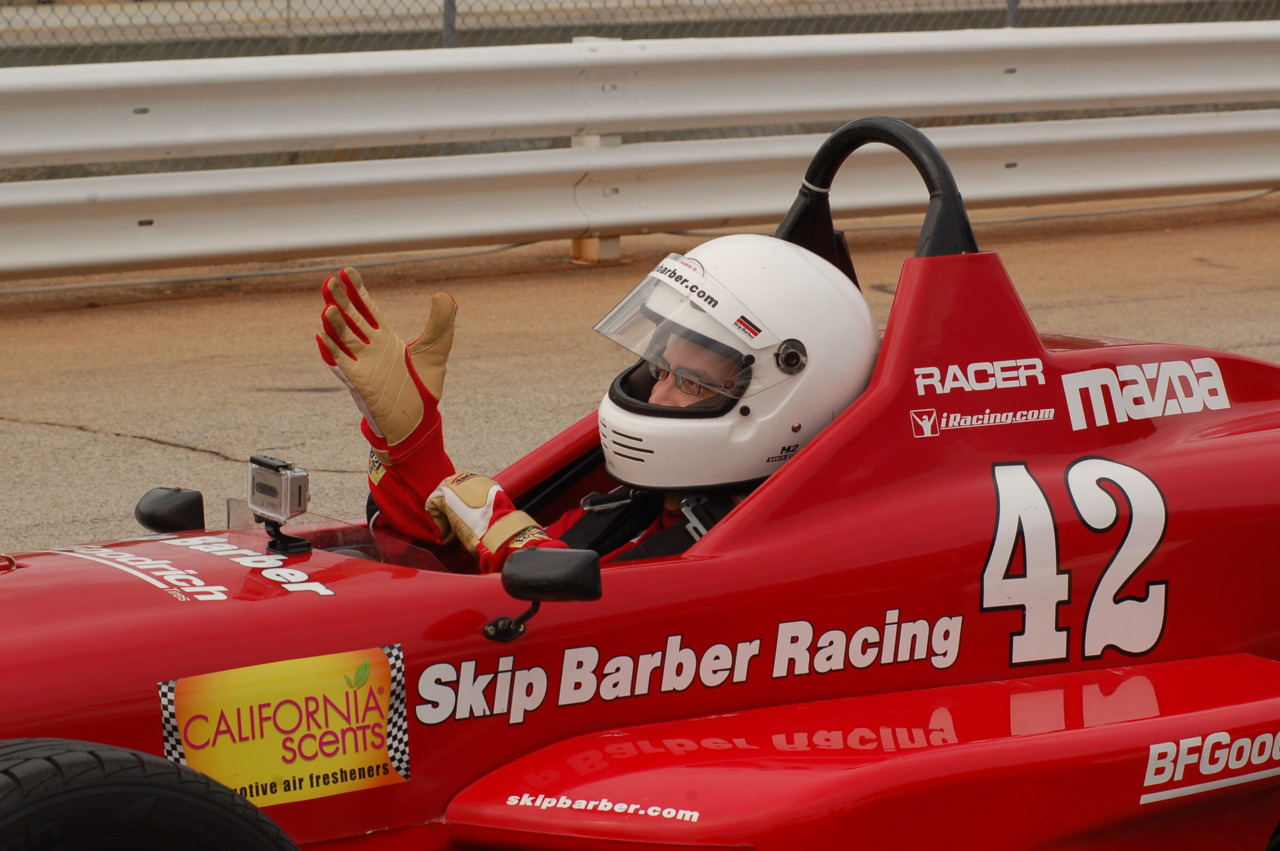Meeting the World's Fastest Gamer
Are racing games on the verge of becoming the next big thing in eSports? Joe Barron speaks to the iRacing grand prix world champion Greger Huttu to find out.
Whenever eSports are mentioned, specific games come to mind: League of Legends, Starcraft 2 and fighting games like Street Fighter IV that are featured in tournaments such as EVO. Professional gamers have flocked to these titles for sponsorship deals and the opportunities to win big money, but there's another genre that's growing in stature, and it has a much greater connection to a real sport.
iRacing is a multiplayer-only PC racing simulation that re-creates motorsport in meticulous detail. The game uses real-world rules and regulations in all of the major racing categories, from Formula One to NASCAR and sportscar racing. The tracks are the most accurate ever created for a game, using advanced laser scanning techniques to perfectly match the virtual tarmac to the real asphalt. Real racing drivers throughout the world use iRacing to practice, and the service has over 40,000 competing members.
The racing is brutally realistic. Drivers are punished for dangerous driving, encouraging a level of fair and clean competition that's unheard of in other racing games. The pinnacle of the iRacing scene is the Grand Prix World Championship and its greatest champion is Greger Huttu, a mild-mannered speed freak from the tiny town of Vaasa in Finland. He has won this prestigious title twice and he is the fastest virtual racing driver on the planet.
The tracks are arguably the most accurate ever created for a game, using advanced laser scanning techniques to perfectly match the virtual tarmac to the real asphalt.
"I guess I've always been interested in cars and especially driving, not so much the mechanical side of them," says Greger. "When I was a kid I wasn't that much into motorsport, instead I used to play football and sports like that. In the early nineties I remember reading a review of the Formula One Grand Prix game by Geoff Crammond and it seemed really interesting. It was one of the most realistic racing games back then and I was pretty much hooked the first time I tried it. I really enjoyed the challenge of what was needed to drive the car well. Of course if you look back at it now, it wasn't realistic at all, but the challenge of hitting a good lap was still there."
Greger's continued interest in racing was inspired by another flying Finn who was climbing up the ranks of real motorsport at the time, on his way to two Formula One World Championships: legendary McLaren driver Mika Hakkinen.
"Playing F1GP got me more interested in real motorsports and it didn't hurt that Mika Häkkinen was just starting his career in F1, so I started to follow F1 very closely. One nice thing with realistic racing games is that you can learn about real racing, and that makes it more enjoyable to watch the races. It can be something simple like just knowing the tracks inside out or something more complex like car setup and handling."
Though Greger was enjoying his first experiences with simulation racing, he had yet to take on the challenge of racing against human opponents. Once he did, he showed a natural talent for going very, very fast.
"I'd say I started sim racing properly when Grand Prix Legends was released in 1998 and I was winning races pretty much from the beginning. There were guys at the time that I thought were better than me but I had just gotten my first wheel and pedals back then. As I got used to them I started winning more regularly. I never could have imagined what would happen in the future when I bought my copy of Grand Prix Legends on a rainy autumn evening. I was still doing my real driving school back then! I never thought I'd be as successful as I have been or that sim racing would be what it is now. I had never done any online racing or online gaming before either, so just doing that was magical itself. It's pretty funny to think about it all now."
Greger's first online races showed promise, but he was still entering into the unknown. Today, getting started in a title like iRacing can be incredibly intimidating for new players. The level of realism is far more intense than in console racing games, even when compared to Forza Motorsport and Gran Turismo.
It's all the more difficult in tournaments like the Grand Prix World Championship, which puts all of the drivers in the type of same car, the Williams-Toyota FW31 from the 2009 Formula One season. Sharing the same machinery makes for incredibly close racing, which makes Greger's wins all the more impressive. In the 2012 season he had an intense battle with 2011 champion Hugo Luis. The two drivers dominated the season, winning all but two of the sixteen races between them. Luis managed six wins, but Greger took the title with eight victories. In fact, Greger was so consistent that by round eleven he was in a position to take the championship, even if he finished behind his rival at every one of the remaining five races.
The key to victory, Greger says, is understanding the physics system, and good old-fashioned practice. But, he admits, some decent racing gear helps too.
"Definitely get a steering wheel and pedals. You can get a decent set for $100 but if you want something better the new Fanatec Clubsport Wheel offers great force feedback and you can buy different wheels for it which resemble steering wheels found in real race cars."
"You can learn a lot by just watching replays of faster drivers and analysing what they're doing differently. I wouldn't worry about car setups at first. The main thing is to have an easy setup and slowly working on your driving. We're also hoping to have a driving school in the near future on our Team Redline website."
"The school is still in the planning phase but there will be different stages and options. A lesson could start with the basics of setting up the wheel and pedals and other settings and then move on to analysing a student's replay and comparing telemetry. Finally, a live online session could be used to teach some finer details and race-craft. Nothing is set in stone at the moment and I'm sure things will change even after we get this going as we learn how to do things most effectively."
In most eSports, the pinnacle of success is to win the world championship in your game. In simulation racing though, recognition can go far beyond that. After his first iRacing World Championship, Greger tested real racing cars in the United States and was profiled in Top Gear Magazine. He won $10,000 for each of his iRacing Championships and he can even count NASCAR’s Dale Earnhardt, Jr. amongst his fans. Has success changed his life?
"I don't think of myself as a sim racing celebrity or anything like that."
"I don't think of myself as a sim racing celebrity or anything like that. Of course I'm well-known in the community but sim racing is still pretty small scale so it hasn't changed anything for me and that's fine. I just enjoy what I'm doing and I've gotten to do some nice things thanks to sim racing. Prize money is not quite there yet to make a career out of this, but at the same time it's not bad for a hobby. It's a nice bonus and maybe one day things will be even bigger, but for me the main thing is to have fun and I'll stick around as long as that is the case."
Testing the real Star Mazda single-seater racing car at Road Atlanta was one of the highlights of Greger's career. It's a car he has driven for thousands of miles in iRacing, but even this most accurate simulation is still not quite perfect.
"If you're a real racing driver and you're trying out a racing sim for the first time, it's going to feel less grippy than the real car even if that's not really the case. You get much less feedback in a sim compared to a real car so it takes a long time to really learn to use the visual cues you get in a sim. The physics engines in racing simulations aren't perfect yet so I felt like the real racing cars I tried were easier to drive under the limit than in iRacing. But like I said, it's quite hard to compare as you get so much more feedback in a real car. Some racing games will feel weird as they're not simulating the car properly so on occasions the car will do something really strange which will break the immersion. That's the strength of simulations. As long as they're simulating things properly the car shouldn't do anything unexpected."
Despite Greger's success earning him a test in a real racing car, he has never been offered a racing seat in the real world. Gran Turismo 5's top players have been able to enjoy amazing opportunities through the GT Academy programme, with some drivers going on to success in the prestigious Le Mans 24 Hours. Perhaps Greger is playing the wrong game!
"I actually haven't followed GT Academy that closely, but I know a couple of guys from the PC racing community who have participated in it and done really well. I think it's great and it never hurts to get more recognition for racing games. It would be fantastic to have something similar on the PC side, but maybe I'll just have to get a PS3!"
"Last year I participated mainly in the iRacing World Championship races, which meant one race every two weeks. The Grand Prix are full length, so they last about 90 minutes. I try to practice at least a little every day, but that doesn't always work out, so I'd say the average practice time ends up being about 30 minutes per day."
While drivers like Greger have embraced iRacing, its unusual pricing model is likely to discourage casual racing fans. An annual subscription currently costs $75 and gives you seven cars and ten tracks. Additional cars and tracks cost around $20 each. Committing to a sanctioned iRacing championship also requires a big time commitment, with scheduled practice, qualifying and race sessions for each round. Is this dedication worth it?
"With iRacing you get what you pay for, especially with the tracks which are easily the best around and the organized racing is something that doesn't exist in any other sim. I don't think it necessarily takes a lot of time to race in iRacing if the schedule of the series you want to race in works out for you. Sometimes it doesn't and then it can be tough to find the motivation and time to keep racing. However, there are rookie races every hour so new drivers should be able to find a race without too much trouble. I think the problem is more in the top series where races don't go off so often, so you have to plan to race on a certain day and time, rather than just racing when you actually feel like it."
E-Sports are now getting lots of attention in the games media, but racing games have not enjoyed a similarly high profile. The potential for interest is high, but perhaps the grounding in a real sport makes it less interesting for gamers, making virtual racing more of a niche.
"I think racing sims are perfect for E-sports as they're very immersive and it's easy to see what's going on."
"The racing sim community is definitely very small compared to ones in mainstream games like Starcraft. I think racing sims are perfect for E-sports as they're very immersive, and it's easy to see what's going on in the races as opposed to understanding what's happening in a game like Starcraft. I think there would be a lot of potential with racing games."
With racing games like TrackMania Forever beginning to embrace the popularity of the free-to-play model on PC, the genre is likely to change dramatically over the coming months and years, but what does the world champion hope for the future of virtual speed?
"More choice can't be too bad! It will be interesting to see how free-to-play titles do in a couple of years. In the end I think it comes down to the quality of the sim. If you have a free sim that is awesome, it should turn out to be very popular. I've seen examples where free-to-play means that the game content and quality isn't very good, which won't work in the long run. I doubt iRacing will go free-to-play, at least for as long as they keep their current online racing structure. Also going the free route would mean it would be harder to keep the racing clean and fun."
"The hardcore PC sims will focus mainly on online play and will have various licensed content like is the case with iRacing, rFactor 2 and Assetto Corsa. The mainstream racing games will have more complete single-player features like career mode and these games will always be popular but hopefully we'll see the most realistic simulations becoming more popular as well. There might be a need to make them more accessible in some ways and having improved graphics and other features definitely won't hurt."
"In the end I don't see much change coming up on the software side, but new hardware like the Oculus Rift is very interesting and could be a huge deal for immersion if it works well."
Greger is currently taking on Hugo Luis in the new Grand Prix season. Follow his progress and see if he can successfully retain his Grand Prix World Championship title at iRacing.com.
'Got a news tip or want to contact us directly? Email news@gamespot.com



Join the conversation